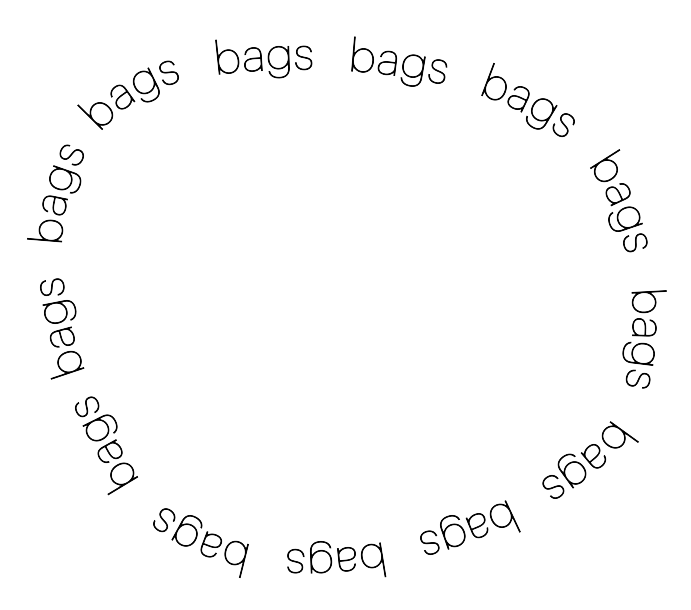Waste, Not Waste Syllabus
Jumping off from anthropologist Mary Douglas' assertion that waste is “matter out of place”, this class uses shared readings and collective diagramming to explore the sociocultural classifications that construct ‘waste' and some of its spatial consequences. Shifting towards our futures, what are some alternate value systems or modes of action (care work, abolition, a Green New Deal, etc.) that can shift dominant cultures around waste? And where would the design professions fit in that? We don't have the answers but we can explore possibilities together. Each meeting session would be based on topics around the subject of waste, and be structured around discussion and in-class collective diagramming exercises with the goal of creating a collective map of un-wasting.
*Class times may be adjusted to fit everyone’s time zones after the first class meeting 🕰
Tuesday, 01.05 / 3-5pm - Indexing, p.I (wasting)
Bring: ~5 examples of what someone might call “waste” from the news/articles/books/your life experience.
Read (only the pages indicated; whole pdf is optional):
- Mary Douglas, Purity and Danger. p.35-36.
- Max Liboiron, There’s no such thing as “We”. Discard Studies. https://discardstudies.com/2020/10/12/theres-no-such-thing-as-we/
- Italo Calvino, Invisible Cities. Clarice p.106-108 and Leonia p.114-116.
Optional:
- Matt Burgermaster, Pass the Leftovers!. Urban Omnibus. https://urbanomnibus.net/2020/02/pass-the-leftovers/
- Rosie Cox, Domestic Dirt in the Home. In Reserve: The Household! p.196-197
- Katherine Gibson, The World as One Household. In Reserve: The Household! p.316-320
- Jeremy Till, Architecture Depends. Chapter 4 Time of Waste. p.67-75.
Thursday, 01.07 / 3-5pm - Indexing, p.II (unwasting)
Bring: ~5 examples of what someone might call “unwasting” from the news/articles/books/your life experience.
Read (only the pages indicated; whole pdf is optional):
- Shannon Mattern, Maintenance and Care: A working guide to the repair of rust, dust, cracks, and corrupted code in our cities, our homes, and our social relations. p.1-4,16. [but honestly, all]
- Steven Jackson, Rethinking Repair p. 221-223, 227-231.
- Green Dreamer podcast, 278; Dr. Chelsea Mikael Frazier: Learning environmentalism through the lens of Black Feminism. 46 min.
- Daniel Abramson, Obsolescence: Notes toward a history in Building Systems: Design, Technology, and Society (ed. Kiel Moe, Ryan Smith) p.168-169.
Optional:
- Max Liboiron, Waste Colonialism. Discard Studies. (abt 4 pgs)
- Jerome Denis, David Pontille. Beyond breakdown: Exploring Regimes of Maintenance. p.13-16.
- Rob Holmes, The Problem with Solutions. Places Journal
- Hwang Sok-Yong, Familiar Things, p.8-14.
Tuesday, 01.12 / 3-5pm - Connecting, p.I (conceptual)
Bring: Pick 2 examples from the Miro board not yet addressed, and answer set of questions for those. Think about ideas for overview organization of the Miro board into a collective diagram.
Read (only the pages indicated; whole pdf is optional):
- Jane Bennett, Vibrant Matter, The “Small Agency” of Worms p.95-98
- Anna Lowenhaupt Tsing, Mushroom at the End of the World, Arts of Noticing (Chapter 1) p.17-25;
- Naomi Klein, on valuing the labor of care, panelist in How To Beat Coronavirus Capitalism. https://www.youtube.com/watch?v=5lxwLHRKaB0 (2 minutes: 1:00:37-1:02:24)
- Lisa Parks, Media Fixes: Thoughts on Repair Cultures. (~3pgs) https://www.flowjournal.org/2013/12/media-fixes-thoughts-on-repair-cultures/?print=print
Optional
- Bruno Latour and Albena Yaneva, “Give Me a Gun and I Will Make All Buildings Move”: An ANT’s View of Architecture. p.80-89
- Donna Haraway, Situated Knowledges: The science question in feminism and the privilege of partial perspective p.583-584, 589-590.
- Discard Studies Compendium. Solid Waste Management, Wastelands, one other post of your choice. https://discardstudies.com/discard-studies-compendium/
Thursday, 01.14 / 3-5pm - Connecting, p.II (practice)
Bring: Any prep work for the collective diagram.
Read (only the pages indicated; whole pdf is optional):
- adrienne maree brown, Outro in Octavia’s Brood: Science Fiction Stories from Social Justice Movements. p.279-281
- Jess Myers, Kinship from Log 48: Expanding Modes of Practice p.135-139, esp 138-139
- Angela Davis, Are Prisons Obsolete?, Introduction - Prison Reform or Prison Abolition? p.15-17; Abolitionist Alternatives p.105-108, 111-114.
- Ruth Wilson Gilmore, this quote: “Abolition requires that we change one thing, which is everything. Abolition is not absence, it is presence. What the world will become already exists in fragments and pieces, experiments and possibilities. So those who feel in their gut deep anxiety that abolition means knock it all down, scorch the earth and start something new, let that go. Abolition is building the future from the present, in all of the ways that we can.”(from https://thefunambulist.net/making-abolition-geography-in-californias-central-valley-with-ruth-wilson-gilmore if you want to read all)
Optional
- The Intercept + The Leap. A Message from the Future II: The Years of Repair. 8 min 57 seconds. https://www.youtube.com/watch?v=2m8YACFJlMg
- Audre Lorde, The Master’s Tools Will Never Dismantle The Master’s House. p.25-28.
- Eve Tuck, Suspending Damage: A Letter to Communities. p.419-421, p.422-424
- Anna Lowenhaupt Tsing, Mushroom at the End of the World, Working the Edge (Chapter 4) p.61-66
- Leah Lakshmi Piepzna-Samarasinha, Crip Lineages, Crip Futures. from Care Work: Dreaming Disability Justice. p.240-256, esp 248 on.
- Ann Lui, Toward an Office of the Public Architect in Log 48: Expanding Modes of Practice (p. 39-52)
- Graham and Thrift, Out of Order: Understanding Repair and Maintenance. p.1-7, 11.
- Hi-ilei Julia Kawehipuaakahaopulani Hobart and Tamara Kneese, Radical Care: Survival Strategies for Uncertain Times. p.1-13
- Green Dreamer podcast, 284; Sandra Goldmark: Redefining materialism and reviving the repair economy. 37 min.
